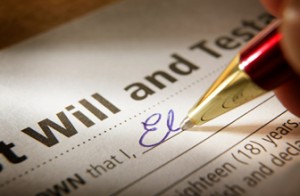As the saying goes: “Nothing in life is certain – except death and taxes”. To this, we would add: “If you don’t make a Will, your assets may not be sufficiently protected when you die.”
Everyone should make a Will. It may be one of the most important things you ever do – because it gives you control over what happens to your money, property and other assets (your estate) on your death.
If you don’t make a Will, you will die intestate. This means the state decides who gets what – and that may mean a relative you have fallen out with inherits something from your estate; or someone you would want to benefit from your estate will not receive anything. This is because the intestacy laws set out a fixed hierarchy of who inherits a deceased estate if there is no Will – starting with the nearest relatives.
In addition, someone will be appointed by the court to look after and administer your estate on your death. This could be an individual (or individuals) who you do not like or trust in life – and who you would not have chosen for such an important role.
What difference does making a Will make?

You get to choose who inherits your estate. You also get to choose who administers your estate when you die. You can appoint executors (your estate trustees) who you know and would trust to look after your estate.
Importantly, you can reduce (or even negate) your potential tax liability by making a Will. Wills are a critical tax planning device to help you save estate administration tax. For instance, you can create trusts and control how much a beneficiary inherits, in order to minimise any taxes – meaning more money for your chosen beneficiaries.
Could someone challenge my Will?
Wills disputes are not uncommon, and often relate to allegations of lack of mental capacity to make a Will, or because a Will has not been properly executed, or its terms are unclear. Sometimes, jurisdictional issues arise: it’s important to ensure that your Will adequately deals with any money or assets you own in another jurisdiction.
Importantly, someone can bring a claim if they believe they should inherit (or have not received sufficient) under your Will. Note that you cannot completely disinherit your spouse or minor children. For this reason, when you make a Will you must always consider whether someone could have a valid claim against your estate. For instance, if you are financially maintaining someone (such as an adult child in education) at the time of your death, they are likely to challenge your Will. Adult children may even challenge a Will if the division of property is considered unfair. However, you may be able to disinherit the (adult) ‘black sheep’ of the family – so long as they are not dependent on you.
If you have not yet made a Will, take legal advice now. Will challenges are notoriously expensive and drain the estate of its assets. The cost of making a Will now is worth your peace of mind, and minimizes the risk of problems arising when you die.
How can we help Make a Will?
If you considering making a Will, contact us for specialist legal advice. The experienced Toronto Will and Estate lawyers at Rogerson Law Group can expertly guide you through the Will making process and give you the advice you need before you sign your Will.
Will lawyers at Rogerson Law Group provide will drafting services in the entire GTA including Toronto, Scarborough, Mississauga, Vaughan, Brampton, Richmond Hill, Etobicoke, and Barrie and surrounding areas with offices located in downtown Toronto, Barrie, and an associated office Ottawa.


